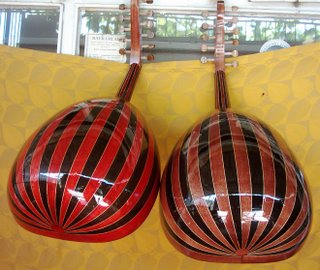
I wanted to buy myself a new instrument of some sort on Father's Day this year, as I did last year, but the budget, alas, was too tight. Instead, I picked up some new strings for my oud, and spent the afternoon restringing it. Astonishing results, worth mentioning here!
As one or two of you may remember, I ordered my oud directly from a Turkish luthier,
Haluk Eraydin. Mine is the one on the right, up above. A beautiful instrument, which arrived in perfect condition in its crate last fall, but it had never sounded quite as loud or as compelling as I had imagined. I had heard from other members of
Mike's Oud Forum that I should put a new set of strings on the oud, and
Aquila strings seemed to be the top recommendation. (Indeed, Haluk's best quality ouds come with these as standard equipment, but not his learner model.) But I hemmed and hawed over the decision, unsure whether I should order strings for Turkish or Arabic tuning, and the months went by.
(You see, I fell in love with the oud in Arabic music, but could afford a better-quality Turkish oud, and had read on a number of websites that learner-model Turkish ouds were generally better made than comparably priced Arabic instruments. The Turkish / Armenian tuning is a full tone higher than the Arabic, however: EABead, as a rule, rather than CGAfgc, although there are other competing tunings out there for both, and Bashir-style ouds that are tuned even higher. But I digress.)
A few months ago, the decision was made for me by a new book: an
Oud Method 
by Armenian
oudist John Bilezikjian, which I picked up on Amazon.com. It gave me the chance to, well,
learn to play the instrument, rather than simply noodle around, as I'd been doing since I bought it. And as you might expect, Bilezikjian writes it for an oud tuned to Armenian tuning.
The long and the short of it is this: I
ordered some Aquila strings, put them on--a slightly more complicated process than restringing a guitar, but not much more--and have been stunned and delighted. It's like a new instrument: twice as loud, twice as resonant, and a joy to play. My son still laughs at me; he thinks all plucked string instruments are essentially the same. (What do you expect? He plays clarinet and piano.) But I pluck my little scales and exercises nightly after dinner, learning to handle my
mizrap, and I'm having a blast. I figure I'll just have to buy a second oud to keep in Arabic tuning, once I've saved up.
Hmmm... Either that or a
Celtic harp.







